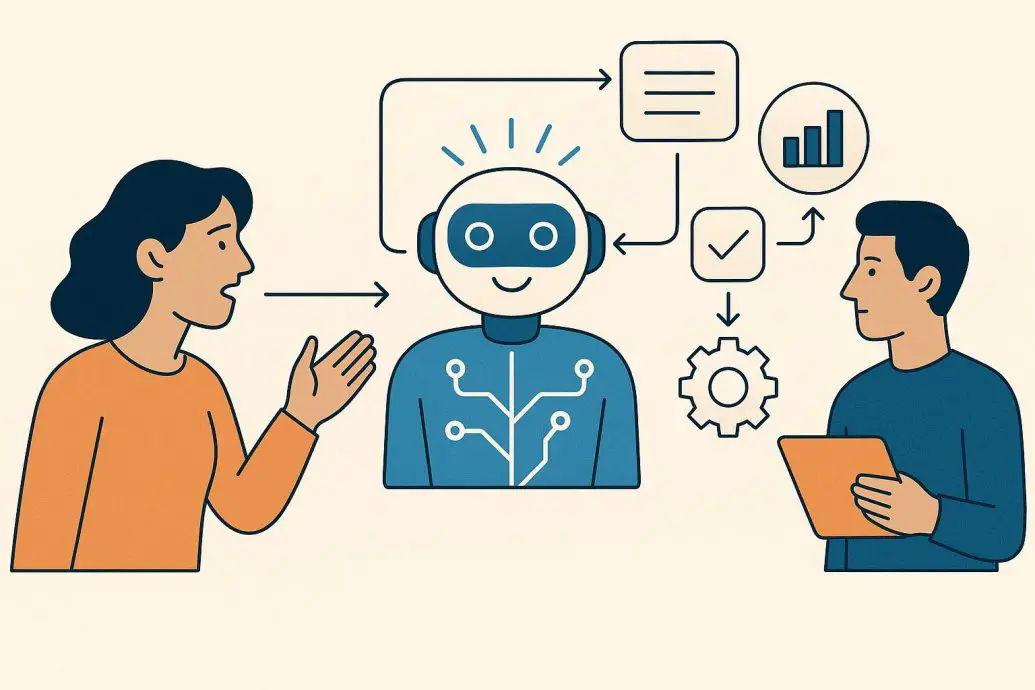AI Agents Revolutionize Daily Workflows
AI Agents Revolutionize Daily Workflows, and they are no longer just futuristic hype. Across industries like tech, logistics, customer service, and marketing, autonomous AI agents such as AutoGPT and AgentGPT are significantly improving productivity by managing repetitive, cognitive tasks. From generating reports to coordinating complex operations, these agents use advanced large language models (LLMs) and integrate with tools and APIs to act independently based on high-level goals. Professionals and teams are using these AI tools not just to work faster, but to rethink how work is organized entirely.
Key Takeaways
- AI agents automate multistep tasks using LLMs, memory, APIs, and feedback loops.
- Open-source tools like AutoGPT and AgentGPT offer flexibility, while commercial copilots provide enterprise-grade support.
- Industries report productivity gains, such as 30 percent faster reporting and 40 percent reduction in customer service workload.
- Beginners can try AI agents on platforms like AgentGPT or with local setups using step-by-step guides.
Also Read: Understanding AI Agents: The Future of AI Tools
Table of contents
What Are AI Agents?
AI agents are autonomous software programs powered by artificial intelligence that perform complex tasks with minimal human involvement. Unlike traditional automation tools that follow preset rules, AI agents can dynamically decide how to achieve goals based on context, live data, and toolkits. These agents simulate reasoning by planning, executing, and adapting based on feedback loops.
Examples include:
- AutoGPT: An open-source, Python-based agent built on GPT-4 that loops through thinking, planning, and executing steps to achieve objectives.
- AgentGPT: A browser-based application that allows users to run AI agents without writing code. It is helpful for business and creative tasks.
How Do AI Agents Work? (Tech Breakdown)
The foundation of an AI agent consists of several components working together:
- Large Language Models (LLMs): Models like GPT-4 provide reasoning, text generation, and decision-making functions.
- Memory: Agents maintain both short-term and long-term memory, letting them build knowledge across steps and adjust behavior.
- Tool Integration: These agents access APIs or plugins to interact with other software such as databases, spreadsheets, or CRMs.
- Task Chains: Instead of performing a single operation, agents execute a sequence of tasks. They plan, gather data, act, then assess before repeating.
Visual Guide to AI Agent Workflow:
Example process: User defines a goal. LLM determines the next step. Agent performs a task via API such as sending an email or retrieving stock data. It analyzes the result. The cycle continues until the task is complete.
Also Read: Google Accelerates Launch of AI-Powered Agents
Comparing AutoGPT, AgentGPT, and Commercial Copilots
Choosing the right AI agent depends on your team’s needs, technical skills, and budget. Review the comparison below:
| Feature | AutoGPT | AgentGPT | Microsoft Copilot / Rabbit R1 |
|---|---|---|---|
| Open Source | Yes | Yes | No |
| Ease of Use | Medium (CLI setup) | High (Browser UI) | High (Integrated into apps) |
| Commercial Support | Community only | No | Yes |
Also Read: AI Agents in 2025: A Guide for Leaders
Top Use Cases by Industry
- Marketing: Agents handle bulk content scheduling, SEO optimizations, and campaign summaries. A mid-size agency using AgentGPT cut campaign launch time in half.
- Software Development: AI agents help debug code and manage repositories. AutoGPT has been used to submit automated GitHub issues with proposed improvements.
- Logistics: Agents automate shipment tracking, update notifications, and delivery rescheduling. One SME reduced dispatch time by 22 percent.
- Customer Support: Agents resolve simple queries automatically and send only complex tickets to human teams. A startup reduced support team workload by 40 percent.
How to Try AI Agents Yourself (Step-by-Step)
Option 1: Use AgentGPT (Browser-Based)
- Go to AgentGPT
- Enter a goal (such as “Plan a one-week content calendar with trending hashtags”)
- Click “Deploy Agent” and observe each decision step in real time
Option 2: Install AutoGPT Locally
- Install Python 3.10 or newer
- Clone the AutoGPT repository from GitHub
- Add your OpenAI and other API keys in the configuration file
- Run the main script, then provide your AI agent with a clear objective
Choose AgentGPT for a simpler experience. Use AutoGPT if you need advanced control or access to local resources.
Limitations, Risks, and Ethics
- Data Security: AI agents can access private information. Always apply privacy safeguards and secure your API keys.
- Output Accuracy: LLMs may generate inaccurate responses. Keep humans in the loop for tasks involving critical systems or sensitive decisions.
- Workforce Impact: Some roles are changing as AI handles repetitive functions. Training and reskilling are important for affected teams.
- Misuse Potential: Poorly regulated agents could perform excessive scraping or generate harmful content. Define use cases carefully and monitor agent actions.
FAQs on AI Agents
What are AI agents and how do they work?
AI agents autonomously perform tasks using LLMs, embedded memory, and toolkits. They define steps, execute them, assess progress, and iterate toward a final outcome.
What is AutoGPT used for?
AutoGPT automates task chains such as writing reports, handling emails, performing technical analyses, or maintaining business operations like invoice follow-ups.
How do I start using AI agents?
Try AgentGPT for a browser-based option with no installation needed. For deeper customization, install AutoGPT using a local Python environment and API keys.
What’s the difference between AutoGPT and AgentGPT?
AutoGPT runs locally and is designed for technical users who want flexibility. AgentGPT works in the browser and is better for quick testing or non-technical workflows.
Are AI agents replacing jobs?
AI agents are redefining tasks and workflows, particularly in jobs involving routine steps or data handling. Teams should plan for upskilling and role evolution along with adoption.
